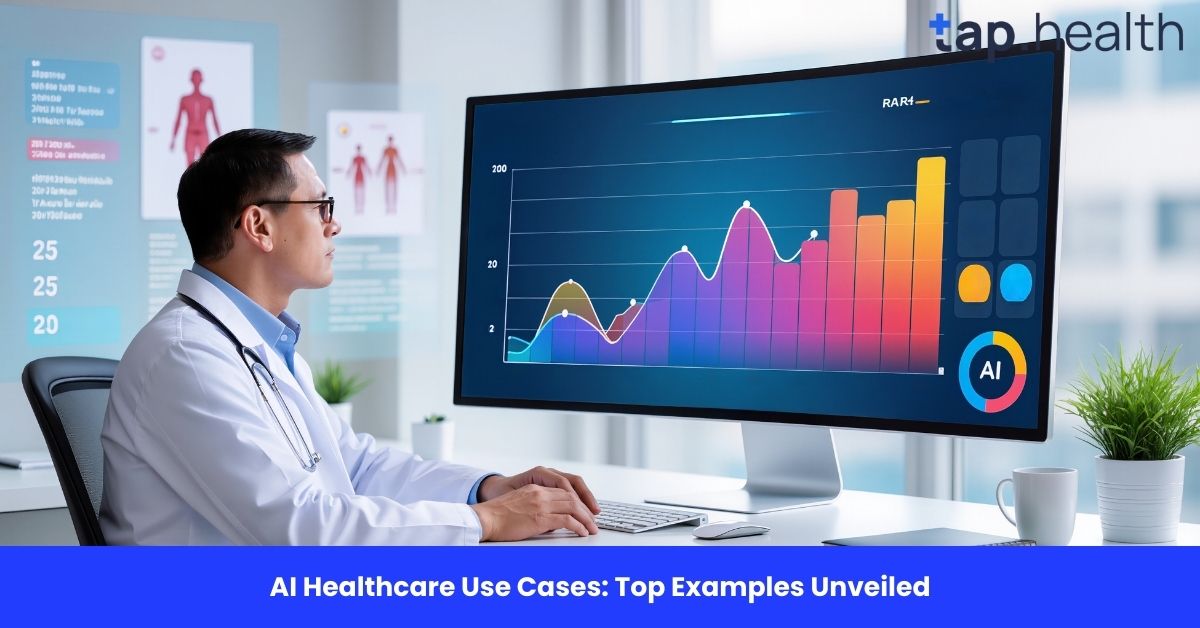Artificial intelligence is quickly changing the healthcare industry. It promises to improve patient outcomes in many ways. AI can analyze large amounts of data and spot patterns. This makes it a great tool for healthcare professionals. They can use it to make better-informed decisions. AI helps in diagnosing diseases more accurately. It also personalizes treatment plans for each patient. The potential of artificial intelligence in healthcare is huge.
What are some good use cases for artificial Intelligence in healthcare?
The uses of artificial intelligence in healthcare are many and varied. AI is set to change nearly every part of medicine. It can analyze complex medical data and spot patterns that are hard to see. This is changing how people receive healthcare.
AI can help in many ways. It makes diagnoses more accurate and helps with smooth administration tasks. Let’s look at some of the key uses of AI in healthcare. These examples show how AI can improve patient outcomes and make healthcare delivery better.
1. Enhancing Diagnostic Accuracy with AI-Powered Imaging Analysis
Artificial intelligence is showing great skill in making medical diagnoses more accurate. This is especially true for medical imaging. AI systems learn from many medical images. They can find small problems and patterns that people might miss.
Machine learning can help analyze medical images like X-rays, CT scans, and MRIs. This helps spot early signs of diseases like cancer. By identifying these signs, doctors can intervene sooner and improve patient outcomes. The advanced image analysis leads to faster and more accurate diagnoses. This allows healthcare professionals to make better treatment choices, which can save lives.
AI’s improved diagnostic accuracy is good for patients. It also helps use healthcare resources better. This leads to more focused and effective care.
2. Personalizing Patient Treatment through Data-Driven Insights
Artificial intelligence is very important in giving better care to patients. It uses the large amount of information found in electronic health records and other healthcare data sources. By looking at individual patient data, such as medical history, genetic information, and lifestyle, AI algorithms help healthcare providers create treatment plans that suit each patient’s needs.
Personalizing treatment plans based on these insights can improve health outcomes. It helps to adjust medication dosages, predict possible drug interactions, and suggest lifestyle changes that fit the patient. This way, patients receive the most effective treatment, which reduces the chance of harmful side effects and makes their healthcare experience better.
AI tools also give patients tailored advice for managing chronic conditions. This helps them take a more active role in their own health and well-being.
3. Streamlining Administrative Processes for Efficiency
Artificial intelligence can do more than help with medical tasks. It is useful for making administrative work easier in healthcare. This can lower the burden of busywork for staff and cut down on costs. With AI, many repetitive tasks, like scheduling appointments or dealing with insurance claims, can be done automatically.
This lets healthcare providers spend more time on patient care. AI systems help minimize mistakes and lower costs for healthcare organizations. By streamlining these tasks, healthcare providers can improve their workflows. This can lead to happier patients and better productivity for medical staff.
4. Revolutionizing Drug Discovery with Advanced AI Algorithms
Artificial intelligence is changing the way we discover drugs. It is making it much faster to develop new drugs and therapies. AI algorithms can look through large amounts of data, like molecular structures, genomic information, and clinical trial results. This helps find new drug options and predict how well they might work.
Using AI in drug discovery has many advantages, including:
- Faster timelines: AI can greatly speed up the time it takes to introduce new drugs to the market.
- Lower costs: By spotting strong drug candidates early, AI helps make research and development spending better.
- Targeted treatments: AI algorithms can find potential drug targets that fit certain patient groups, helping create more personalized and effective therapies.
This faster pace of drug discovery can provide life-saving treatments to patients more quickly, meeting medical needs better than before.
5. Improving Patient Monitoring and Remote Care via IoT and AI
Artificial intelligence is changing healthcare by making it easier to monitor patients and provide care from a distance. It uses IoT and AI technologies together. This helps healthcare providers to watch vital signs and check patient data right away. They can even predict possible health problems. This smart way of working allows early disease detection and helps create personalized care plans. Plus, remote monitoring reduces the need for patients to visit hospitals often. This lets patients take charge of their health at home. In the end, this leads to better health outcomes.
6. Optimizing Clinical Decision-Making with Predictive Analytics
Using predictive analytics in healthcare can change how clinical decisions are made. AI algorithms can look at large amounts of patient data and medical records. This helps medical professionals create better treatment plans. Predictive analytics allows healthcare providers to make informed decisions based on data. This leads to accurate diagnoses and personalized care for patients. This new technology improves the healthcare sector by making diagnoses more accurate and streamlining administrative tasks. It also boosts patient outcomes through tailored care. AI-driven predictive analytics are helping make clinical decision-making more efficient and precise in the healthcare industry.
7. Facilitating Early Disease Detection through Machine Learning
Machine learning is a part of AI and is a strong tool for finding diseases early. These algorithms learn to spot patterns in complex health data. This helps them find early signs of diseases before doctors can see them.
By looking at patient data like medical images, genetic information, and lab results, machine learning models can find early clues of diseases such as cancer, heart disease, and Alzheimer’s. Early disease detection is very important as it can lead to better patient outcomes. It helps doctors act quickly and choose the best treatment strategies.
Also, catching diseases early can lower healthcare costs. It allows for treatments that are less invasive and start sooner.
8. Ensuring Accurate and Efficient Electronic Health Record Management
Electronic health records, or EHRs, are very important in today’s healthcare. They hold a lot of patient data that can help improve care. However, managing and analyzing this large amount of data can be very hard for healthcare providers.
Artificial intelligence can help make electronic health record management more accurate and efficient. It can automate data entry, find and fix errors, and pull out useful insights from patient records. AI tools can also help share data and connect different healthcare systems.
By making healthcare data better and easier to access, AI helps healthcare providers work more efficiently. This, in turn, allows them to provide better patient care.
9. Enhancing Patient Engagement and Education through AI Chatbots
AI chatbots use natural language processing to change how patients engage and learn in healthcare. These virtual assistants talk to patients like people do. They give personal information, answer common questions, and help patients understand healthcare services.
Chatbots are available 24/7. They make it easier for patients to get information and help healthcare staff manage their tasks. They also share educational content based on what patients need. This helps individuals make informed decisions about their health.
By improving patient engagement and providing easy access to information, AI chatbots help create better experiences in healthcare.
10. Advancing Genomic Research with AI for Personalized Medicine
AI technology is changing the game in genomic research. It helps create new ways to offer personalized medicine. AI algorithms can sort through huge and complex datasets. This makes them very useful for understanding genetic data and finding genes that relate to diseases.
By examining genomic data, AI can help spot people at risk for certain diseases. It can also predict how well drugs will work and create treatments that fit a person’s unique genetic makeup. This personal approach to healthcare could make treatments more effective and reduce side effects.
The integration of AI in genomic research is speeding up new discoveries. It is transforming how we understand, diagnose, and treat diseases.
What is an example of a use case in healthcare?
One compelling example of AI use cases in the healthcare industry is in the field of oncology. AI algorithms can analyze medical images such as CT scans and MRIs to help oncologists detect and diagnose cancer with higher accuracy. This can lead to earlier diagnoses, more effective treatment plans, and ultimately, better patient outcomes.
Here’s an example of how AI can be used in oncology:
| Use Case | Description |
| Tumor Detection and Segmentation | AI can automatically identify and segment tumors in medical images, helping oncologists assess the size, location, and characteristics of tumors with higher precision. |
Navigating the Ethical Landscape of AI in Healthcare
As artificial intelligence (AI) is used more in healthcare, we need to think carefully about the ethical issues. It is important to make sure that we develop and use AI responsibly. We must pay attention to problems like patient data privacy, fairness in algorithms, and being clear about AI processes. This can help build trust in healthcare solutions that use AI.
Ethics should be the top priority at every stage of AI in healthcare. This includes everything from how we collect data and develop algorithms to implementing and watching over AI systems.
Understanding Patient Data Privacy Concerns
The use of artificial intelligence in healthcare needs a lot of sensitive patient data. We must protect this data to keep patient trust and meet ethical standards. Healthcare organizations should have strong data protection plans to stop unauthorized access, data leaks, or misuse of patient information.
Being open is important to solve patient data privacy worries. Patients need to know how their data is used, why AI algorithms are in place, and how their information is kept safe. Getting informed consent from patients about their data is vital for using AI in an ethical and responsible way.
It is also important to set clear rules for using data. This ensures that patient data is used only for its main purpose and that it respects patient privacy and independence.
Addressing Bias and Fairness in AI Algorithms
Bias in AI algorithms is a big issue in healthcare. It can cause differences in diagnoses, treatment options, and the care that people get. This is especially true for diverse patient groups. AI systems learn from data. If this data shows bias in healthcare or society, the AI may keep or make these biases worse.
To make sure our healthcare solutions using AI are fair, we need to look at bias at every step of the process. This means using a variety of datasets to train algorithms. We also need to check algorithms for any bias and add methods to reduce it in AI decision-making.
It’s important to keep an eye on AI systems as well. This helps us find and fix any new biases that show up over time. We want to make sure all patients get equal and fair healthcare.
Overcoming Implementation Challenges for AI in Healthcare
The benefits of artificial intelligence in healthcare are clear. However, there are some challenges we need to fix to make it truly effective. To connect what AI can do with what happens in real medical settings, we need a wide approach. This includes looking at technology, systems, and people.
To tackle these challenges, we need everyone to work together. This means technology developers, healthcare providers, policymakers, and researchers. Facing these issues directly can help us bring AI smoothly and effectively into healthcare systems.
Bridging the Gap between AI Potential and Clinical Practice
One main challenge in adding AI to healthcare is to close the gap between its great potential and what happens in real clinical practice. Healthcare professionals need easy-to-use AI tools that fit well with their current work processes and electronic health records. It is also very important to deal with worries about data privacy, security, and the ethics of using AI in healthcare.
Another challenge is the need for strong proof of AI algorithms in real clinical situations. Healthcare professionals must feel sure about the accuracy, trustworthiness, and safety of AI tools before using them to make decisions.
Good training programs are key to giving healthcare professionals the skills and knowledge they need to use AI tools well. They should also learn how to understand AI-generated insights and handle any ethical concerns.
Ensuring Interoperability Among Diverse Healthcare Systems
The way healthcare systems are set up now makes it hard for AI to work well. There are big issues because these systems don’t connect easily. For AI to use healthcare data and produce helpful insights, it needs smooth data sharing between different systems.
To fix this problem, we need standard data formats and strong infrastructure. This will help share data securely and efficiently. When healthcare data is easy to share, it can help train AI algorithms, improve data analytics, and create better personal medicine methods.
Also, when systems can work together, it helps healthcare providers, researchers, and tech developers collaborate. This teamwork can lead to better and more effective healthcare solutions.
The Future of AI in Healthcare: Trends and Predictions
The future of artificial intelligence in healthcare looks very promising. It could change how we deliver healthcare. As technology grows, we can expect better AI applications. We will also see more integration of AI into current healthcare systems. This will create a focus on patients.
Trends like telehealth, online care platforms, and more health gadgets will boost AI in healthcare. This will help make healthcare easier to access and more tailored to each person. It will be proactive and more personal.
The Rise of Telehealth and Virtual Care Platforms
The COVID-19 pandemic sped up the use of telehealth and virtual care. This changed how we deliver healthcare in a big way. AI technology is set to become even more important in this changing field. AI-powered chatbots and virtual assistants can answer common patient questions, make appointments, and give initial checks and symptom reviews.
Telehealth, along with AI-driven diagnosis and remote patient monitoring, can help people get healthcare services. This is especially true for those in far-off or underserved places. AI algorithms can help healthcare providers understand medical images and other patient data from afar. This can lead to quick diagnoses and treatment advice.
Also, virtual reality and augmented reality, with the help of AI, can create realistic training for healthcare professionals. They can also improve patient education and support during recovery.
Integration of AI with Wearable Health Technology
The combination of AI and wearable health technology is creating new ways to monitor patients and provide personalized care. Wearable devices, like smartwatches and fitness trackers, collect a lot of health data. This includes information on heart rate, activity levels, sleep patterns, and even ECG readings.
As AI algorithms become better, they can help analyze this data. They can find potential health risks and give personal feedback and suggestions to users. AI can also help with proactive healthcare by spotting early signs of health issues.
Together, wearable technology and AI allow people to take charge of their health. This shift supports a focus on preventive healthcare.
Conclusion
In summary, using Artificial Intelligence in healthcare is a major step forward. It is changing how we care for patients and how clinics work. AI helps in many ways. It improves diagnostic accuracy and personalizes treatments. It also makes administrative tasks easier and enhances patient monitoring. Yet, we must pay attention to ethical issues and protect data privacy. We need to tackle challenges in using these systems and help different healthcare systems work together. This will help us gain the most from AI technology. Looking ahead, trends like telehealth and wearable health technology show the exciting future of AI in changing healthcare.
Frequently Asked Questions on What are some good use cases for artificial Intelligence in healthcare?
1.How can AI improve the accuracy of medical diagnoses?
AI can look at medical images, like X-rays and CT scans. It can also review patient data. This helps healthcare professionals make more accurate diagnoses. As a result, it can help find health issues earlier and start treatment sooner.
2.What role does AI play in patient data management?
AI can help manage patient data better in the healthcare industry. It can make electronic health records simpler to use, improve privacy for data, and find useful insights from patient data.
3.Can AI in healthcare help reduce operational costs?
AI can help healthcare by cutting down costs. It does this by automating administrative tasks. It also optimizes how resources are used. This makes healthcare operations more efficient.
4.How are AI-driven chatbots transforming patient care in India?
AI chatbots are changing patient care in India’s healthcare sector. They offer support all day, every day. This helps to engage patients more and makes it easier for them to access healthcare information and services.



